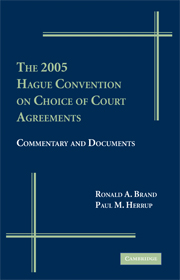Book contents
- Frontmatter
- Contents
- Preface
- PART I A BASIC INTRODUCTION TO THE 2005 HAGUE CHOICE OF COURT CONVENTION
- PART II ARTICLE-BY-ARTICLE COMMENTARY ON THE CONVENTION
- 4 Scope and Definitions (Articles 1–4)
- 5 Jurisdiction (Articles 5–7)
- 6 Recognition and Enforcement (Articles 8–15)
- 7 General Clauses (Articles 16–26)
- 8 Final Clauses (Articles 27–34)
- PART III CHOICE OF COURT IN THE ABSENCE OF A MULTILATERAL CONVENTION
- PART IV LITIGATION AND ARBITRATION CHOICES AFTER THE HAGUE CONVENTION
- Appendix A Explanatory Report by Trevor Hartley & Masato Dogauchi (including the text of the 2005 Hague Convention on Choice of Court Agreements)
- Appendix B Cited Excerpts from the Nygh-Pocar Report
- Index
6 - Recognition and Enforcement (Articles 8–15)
from PART II - ARTICLE-BY-ARTICLE COMMENTARY ON THE CONVENTION
Published online by Cambridge University Press: 26 October 2009
- Frontmatter
- Contents
- Preface
- PART I A BASIC INTRODUCTION TO THE 2005 HAGUE CHOICE OF COURT CONVENTION
- PART II ARTICLE-BY-ARTICLE COMMENTARY ON THE CONVENTION
- 4 Scope and Definitions (Articles 1–4)
- 5 Jurisdiction (Articles 5–7)
- 6 Recognition and Enforcement (Articles 8–15)
- 7 General Clauses (Articles 16–26)
- 8 Final Clauses (Articles 27–34)
- PART III CHOICE OF COURT IN THE ABSENCE OF A MULTILATERAL CONVENTION
- PART IV LITIGATION AND ARBITRATION CHOICES AFTER THE HAGUE CONVENTION
- Appendix A Explanatory Report by Trevor Hartley & Masato Dogauchi (including the text of the 2005 Hague Convention on Choice of Court Agreements)
- Appendix B Cited Excerpts from the Nygh-Pocar Report
- Index
Summary
INTRODUCTION
Chapter III, “Recognition and Enforcement,” contains the third pillar on which the Convention rests: a judgment issued by a court of a Contracting State designated in an exclusive choice of court agreement within the meaning of the Convention shall be recognized and enforced in other Contracting States. Although there are qualifications and conditions placed on the operation of the general rule, the thrust of the Convention is heavily in favor of recognition and enforcement. Where jurisdiction of the court of origin is based on an exclusive choice of court agreement concluded as part of an international commercial transaction, in most cases the resulting judgment will be recognized or enforced under the Convention.
ARTICLE 8(1): A JUDGMENT SHALL BE RECOGNIZED AND ENFORCED
Article 8 Recognition and enforcement
A judgment given by a court of a Contracting State designated in an exclusive choice of court agreement shall be recognised and enforced in other Contracting States in accordance with this Chapter. Recognition or enforcement may be refused only on the grounds specified in this Convention.
Article 8(1) states that, if certain threshold conditions are satisfied, a judgment shall be recognized and enforced by the courts of a Contracting State in accordance with the provisions of Chapter III. “Shall” means that recognition and enforcement is not discretionary, but mandatory.
DEFINING “RECOGNITION” AND “ENFORCEMENT”
The Convention provides no definition of either “recognition” or “enforcement.”
- Type
- Chapter
- Information
- The 2005 Hague Convention on Choice of Court AgreementsCommentary and Documents, pp. 98 - 138Publisher: Cambridge University PressPrint publication year: 2008

